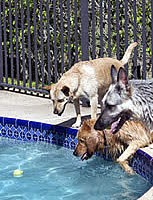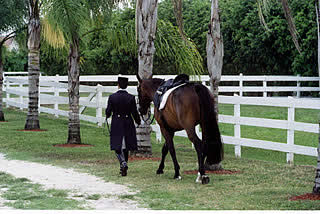At my barn the white dressage arena fence is about twelve inches high. Around that is a taller fence, about five feet high. Around the perimeter of the property is a dog proof mesh fence that’s six feet high! Wow… that’s a lot of boundaries!
There’s a saying that strong fences make good neighbors. This is true figuratively as well as literally. A strong fence can keep danger out, and/or keep someone safely in. A clear fence line makes a strong statement about where my space starts and yours ends.
Personal boundaries are like the low dressage arena fence. They may not keep things in or out, but they clearly mark a line that says “do not cross.” You just have to be aware of that line and be willing to respect it. That’s not so easy, because personal boundaries are so, well, personal!
Some people want physical space, privacy, and to take care of themselves. Others are touchy/feely folks who want to hug and snuggle, love to nurture and care for others, like lots of feedback, and get lonely when left alone.
Figuring out someone else’s boundaries can be confusing and painful. For nurturer types, being rebuffed by the strong, independent types can be painful and confusing. Nurturers tend to react to boundaries as personal rejection, and respond by being openly upset or with passive-aggressive behavior. Independent types often get irritated when their boundaries are questioned or repeatedly pushed against, and can become overtly angry or withdraw all together.
The key to maintaining good boundaries and good relationships is to realize that none of this is personal. It’s just different ways of being. Recognizing that others might have personal rules/wants/needs that are very different from your own is vital in understanding and respecting their boundaries. And if you’re not sure what those boundaries are, ASK! Nothing says “I respect your boundaries” more than directly asking what they are.
If you have trouble with other people’s boundaries, it’s likely that you don’t have a good grasp of your own. Take some time to explore where you do things you don’t want to do, say things you don’t really mean, or act in a way that internally feels wrong. That icky, slimy feeling that shows up when you’re violating your own boundaries is your inner self’s way of letting you know to stop what you’re doing. And if you don’t recognize your own alert to boundary violation, you’re really going to have a struggle recognizing and accepting other people’s boundaries!
If boundaries are an issue for you, I highly suggest you get some assistance to explore new ways of being. Horses spend a great deal of their social time exploring herd boundaries, which is why equine assisted counseling is perfect for this. Horses get it, and they can teach you! You can learn more about this kind of personal work at www.CenterforHorsesandHealing.com or by searching equine facilitated experiential learning.
I know Jane doesn’t like it when I push my head into her. Years ago she set a clear boundary that said banging into her is not okay. So, I don’t do it. Well, unless she’s holding a carrot. Then I may nudge, just a little…
Love, Moshi
From Indy:
I miss Geoffrey. I’m so bummed that he got banned from the barn. But he refused to behave, so he’s never going to be allowed back. That’s the extreme result of violating boundaries.
Moshi and I are very different. I love to snuggle and be close to people. Moshi is much more independent and does not like people pawing at him just to stroke him without reason. I like to chase sticks and balls. I love to swim. And I think it’s very fun to chase rabbits. Moshi prefers the seriousness of dressage, perfecting his pirouettes and one tempis, and maintaining a stable, mature demeanor.

Do you have a friend who’s really different from you? Have you ever wondered why that relationship works? Often, it’s as simple as recognizing your friend’s differences from a place of acceptance and respect. As long as your core values are similar, the contrast in personalities can actually make the relationship stronger and more satisfying. Just be open to the differences!
I’m so glad Jane recognizes that I like to swim! She’ll sit by the pool and read while Chance and I play in the water. I’ll lay by the arena and wait for her when she rides Moshi. We have a terrific give and take relationship. That’s why she’s my very best friend.
Do you have a best friend? I’ll bet your dog thinks you do!
Love, Indy
Jane Savoie
1174 Hill St ext.
Berlin, VT 05602
Jane’s Website
DressageMentor.com
